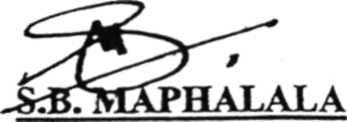IN THE HIGH COURT OF SWAZILAND DUMSELE SEELONGONYANE Applicant And COIVEVHSSIONER OF POLICE Is1 Respondent THE CIVIL SERVICE COMMISSION 2nd Respondent THE ATTORNEY GENERAL 3 rd Respondent Civil Case No. 1130/2007


Coram For the Applicant For the Respondents S.B. MAPHALALA - J MR. P. MSIBI MR. MALINDZISA
JUDGMENT 22nd June 2007
[1] Before court is an application brought under a Certificate of Urgency for an order in the following terms: Dispensing with the normal time limits forms of service and use of form prescribed by the Rules of this court and hearing this matter as one of urgency. Condoning spelling mistakes typographical errors and any grammatical inconsistency apparent on the record of these proceedings, and condoning any non compliance with practice directives applicable in application proceedings either from decided cases or practice notes. Declaring Applicant's dismissal from work by the 1st Respondent to be unlawful and reviewing, correcting and setting the same aside as unlawful. Ordering the Respondents to re-instate Applicant to her position as cleaner at Sigodvweni Police Station or any other equivalent post in any other department of Government forthwith. Directing the Respondent to restore to Applicant or his attorneys all Applicant's salary withheld as a result of unlawful dismissal forthwith. Costs of the application at an attorney and own client scale. Such further and/or alternative relief as the court deems fit. [2] The application is founded on the affidavit of the Applicant where she has annexed a number of documents including a letter dated 10th August 1999 concerning her variation of her appointment from daily paid and now pension to permanent and pensionable establishment, another undated letter from the Commissioner of Police offering her appointment as casual labourer, a memorandum from the Commissioner of Police to her dated 31st October 2006, terminating her service and a letter from the Commissioner of Police to her dated 21st August 2006 concerning allegations of misconduct and dishonesty against her.
[3] The Respondents have filed a Notice of Intention to raise points of law which is the subject-matter of this judgment. The said point of law is the following: "In terms of Section 8 (1) of the Industrial Relations Act No. 1 of 2000 as amended, read together with Section 151 (3) of the Constitution of Swaziland. This Honourable court has no jurisdiction to hear this matter as it falls within the exclusive jurisdiction of the Industrial Court Refer: Swaziland Breweries Limited and another vs Constantine Ginindza (unreported Supreme Court of Appeal Case No. 33/2006". [4] Section 151 (3) of the Constitution of Swaziland reads as follows: "Notwithstanding the provision of sub-section (1), the High Court Has no original or Appellate jurisdiction in any matter in which the Industrial Court has exclusive jurisdiction; Has no original but has review and Appellate jurisdiction in matters in which a Swazi court or court martial has jurisdiction under any law for the time being in force". [5] The court was further referred by the Respondents in argument to Section 189 (5) of the Constitution of Swaziland which provides the following: (5) Subsection (4) does not apply in respect of officers below the rank of Deputy Commissioner of Police who. pending the formal establishment of a sector service commission or similar body, shall continue being the responsibility of the Civil Service Commission, subject to any delegation of that responsibility.
[6] The argument for the Respondents is that the above-cited enactment put it beyond question that this court has no jurisdiction to hear the application before court. On the other hand it was contended for the Applicant that the point of law is misconceived because the High Court has jurisdiction to entertain this matter if the court take into consideration the provisions of Section 3 of the Industrial Relations Act. [7] The gravamen of the argument by the Applicant is that the above-cited section gives this court jurisdiction to hear the dispute before court. [8] I have considered the arguments by the parties regarding the point of law raised by the Respondent and I have come to the considered view that the point is well-founded. I say so on the simple reason that the relationship between the Applicant and the Civil Service Board is one of employer/employee and not that of Applicant and the Commissioner of Police. The Applicant might have worked under the Commissioner of Police but for all intents and purposes her rights as an employee arose from her relationship with the 2nd Respondent being the Civil Service Board. Therefore the proper court to hear this matter is the Industrial Court. [9] In the result, for the afore-going reasons the point of law is upheld with costs. JUDGE